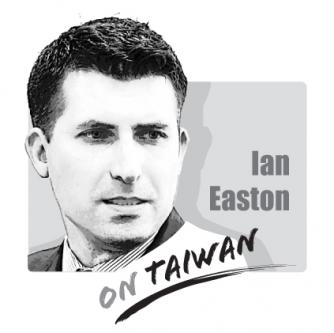Under normal circumstances, Taiwan would be just about to hit its national stride. After years of hard work, Taiwan’s human capital, technology base and governance system are now some of the best in the world. This democratic island nation is poised to prosper in the 21st Century.
But these are not normal circumstances. Taiwan, a country officially known as the Republic of China (ROC), lives under the shadow of an enemy invasion threat. If the Chinese Communist Party has anything to say about it, Taiwan’s democracy will soon be destroyed, and its highly-refined society erased from future memory.
Chinese officials are fond of listing hypothetical circumstances in which they would use force against Taiwan. If their fiery rhetoric is to be believed, China is itching for a cross-strait fight, and will seize upon any excuse to break the peace.
China is putting its money where its mouth is. Over the past two decades Beijing has invested vast sums of China’s national treasure, talent and time into building a military that is tailor-made for assaulting Taiwan. If you think China is not serious about this operation, you are not paying attention to the warning — and authoritative reports regularly published by both the US Department of Defense and the ROC Ministry of National Defense.
As an indication of intent, the Chinese military has ramped up the frequency of its bomber and spy plane flights around Taiwan. Aerial encounters between Chinese and Taiwanese pilots have grown increasingly tense. In addition, Chinese naval ships are more frequently circling the island, gathering intelligence and probing for weaknesses.
Beijing’s aggressive military activities are not just limited to Taiwan’s surrounding airspace and seascapes. They include massive cyber attacks, signals and human intelligence gathering, economic warfare, and psychological warfare. Taken as a whole, these recent actions represent a threat to regional security.
Taiwan’s president, Tsai Ing-wen (蔡英文), has been a model of constraint and moderation. Taipei has done nothing to “provoke” Beijing’s actions. China’s dictatorial leader, Xi Jinping (習近平), has simply chosen to act outside the constraints of responsible international behavior.
The future implications of China’s jingoistic rhetoric, military buildup, and expansionistic maneuvers are disturbing to consider. Regional peace and stability in the Indo-Pacific are slipping away. Xi Jinping has set his nation on a collision course with the US, Taiwan and other Indo-Pacific democracies.
How to prevent war? How to deal with the time bomb China has activated?
It has been fashionable for Taiwanese government officials to say that if the Chinese invade they will get a bloody nose. This statement has zero deterrent value. As China continues escalating its campaign of coercion, Taiwan needs to make it widely known that the full wrath of a free people would meet any invader and destroy him. Not a bloody nose, but rather a hospital bed, skin graft and feeding tube await the assailant.
The realities of modern state-on-state warfare are unknown. Fortunately, the advanced weapons possessed by Taiwan and China have never been tested in battle. Even the US, with its long track record of irregular warfare, is mostly unfamiliar with waging high-intensity war. It is imperative to keep it this way. A major war in the Taiwan Strait is all but guaranteed to be long, lethal and horrific. The human toll would be devastating; the results tragic.
Keeping this explosive situation stable will require a blend of methodical cunning and bold action. President Tsai Ing-wen has established a reputation as a leader who is determined and tough, while also cool under pressure. US President Donald Trump is a strong, hot-tempered nationalist who is impulsive and unpredictable. Both leaders have traits that are valuable for deterrence.
If Taipei and Washington can combine forces, they can keep the Chinese high command off-balance. That is exactly what they should aim to do. China’s leadership is rational. They will wait until the correlation of power favors them before they strike. Beijing pushed rapidly into the South China Sea because it could. Neither then-president Barack Obama, nor president Ma Ying-jeou (馬英九), had the stomach for confrontation, and Xi Jinping knew it.
It is crucial that presidents Tsai and Trump demonstrate their willingness to cut through China’s “red lines.” Allowing Xi Jinping to set the rules of play is a receipt for strategic disaster.
To begin, US-Taiwan defense and security cooperation should be greatly strengthened. Washington should offer Taipei muscular new fighter jets, including F-16s and F-35s. Next, the two countries need to team together in the areas of undersea warfare, missile defense, cyber and electronic warfare, advanced missiles, and unmanned systems. Finally, other democracies should be brought into the joint effort. Japan, India and Australia are the most capable and willing.
Actual war is highly unlikely in the near future. Contrary to its propaganda line, the Chinese military is not yet ready to fight Taiwan in an all-out conflict. What we are now seeing represents a war of nerves. This is an intimidation campaign. But it will worsen over time, and the danger of a real war is growing.
It must be made perfectly clear to Xi Jinping that it’s in his best interest to defuse this time bomb. To make that happen, Taiwan and America must stand up for their security interests and their values. And they must stand together.
There is no time to lose. The countdown has already begun.
Ian Easton is a research fellow at the Project 2049 Institute.
Source: Taipei Times - Editorials 2018/01/08
| < Prev | Next > |
|---|





















